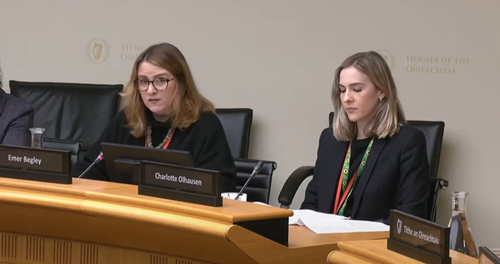DFI Addresses the Oireachtas on Artificial Intelligence
October 21 2025, 11:47am

Our Director of Advocacy Emer Begley and our Policy and Advocacy Officer Charlotte Olhausen appeared before the Joint Oireachtas Committee on Artificial Intelligence to highlight both the opportunities and risks that AI presents for people with disabilities.
Emer and Charlotte called for Ireland’s approach to AI to be firmly rooted in human rights, equality, and accessibility, as required under the UN Convention on the Rights of Persons with Disabilities, UN CRPD.
They told the committee that while AI has the potential to transform lives, through innovations such as voice-to-text technology, accessible mapping tools, and new supports for independent living, it also poses significant risks if not properly regulated and inclusive by design.
“If these risks are not understood and corrected, AI could create new and deeper barriers for disabled people, promoting discrimination and exclusion rather than equality.”
Key Concerns Raised by DFI
DFI’s submission to the committee outlined several areas where action is urgently needed:
Bias and discrimination: AI systems trained on incomplete or biased data risk worsening Ireland’s already significant disability employment gap, currently one of the highest in the EU.
- Resourcing: With the right investment, AI could support voluntary organisations' eficiencies and impact, but without proper resourcing, that potential may remain out of reach.
Accessibility by design: All AI-enabled systems must be universally designed and co-created with disabled people from the outset.
Affordability: The cost of assistive AI technologies should not fall on individuals, especially given the extra Cost of Disability,
Data protection and digital literacy: Accessible training on AI and digital literacy is essential to ensure informed consent, inclusion, and equal participation.
Intersectionality and regulation: AI policy must recognise how multiple forms of discrimination, such as gender, disability, and ethnicity, can overlap and be amplified by technology.
Climate impact: Policymakers must also consider AI’s environmental footprint, balancing innovation with sustainability and social justice.
A Call for Inclusive Innovation
We welcome Ireland’s plan to establish a National AI Office by 2026 under the EU AI Act, disability must be prioritised within its remit to ensure no one is left behind.
“AI should empower people to live independent lives on an equal basis with others,” DFI said. “To achieve this, we need inclusive design, strong regulation, and meaningful collaboration with the disability community.”
We're continuing to work to ensure new technologies are accessible and afordable and work for everyone.
